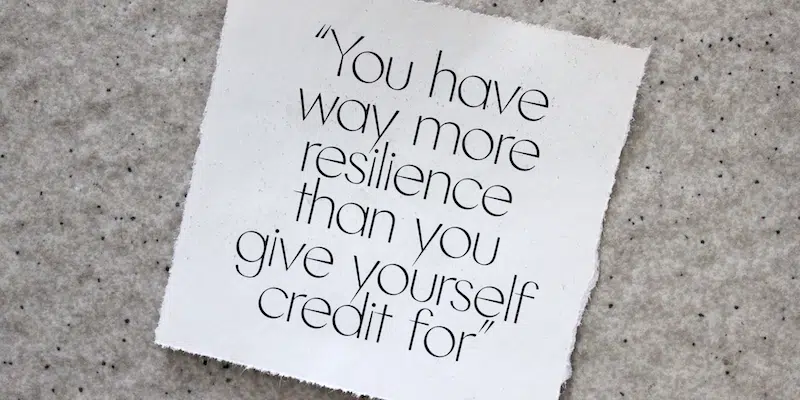When something goes wrong, do you fall apart or easily bounce back? Do you let your failures derail your dreams or do you have the strength to get back up and carry on? Is there one essential trait that can help you accomplish your goals and handle challenges better?
“I’m sorry to say so but, sadly, it’s true that bang-ups and hang-ups can happen to you.”
– Dr. Seuss. This quote by Dr. Seuss from ‘Oh, The Places You’ll Go’ is one I really love.
It reminds me that no matter who we are, children or adults, successful or struggling, we all face challenges. We will fail, get hurt and go through crises multiple times in our life but how we respond to these will determine the outcome – not what happened but how we handled it and what we made out of it. Did we wallow and dwell on our failure or did we acknowledge the problem, learn from our mistake, change our perspective and carry on? What is it that makes us get up each time we fall?
The answer is RESILIENCE!
What is Resilience?
“Do not judge me by my success, judge me by how many times I fell down and got back up again.” – Nelson Mandela
Resilience comes from the Latin word ‘resilire’ which means to rebound, recoil, or spring back.
Dr. Roma Kumar, a Clinical Psychologist, with over 3 decades of experience in the field of Psychology and Mental Health, defines resilience as “the ability to bounce back from adverse events or challenges.”
She believes that while we naturally build resilience through exposure to stressful incidents, trauma, or difficult experiences, we also need to actively build resilience.
Research has shown that resilience is a dynamic process rather than a fixed trait.
Being resilient doesn’t mean that we don’t experience stress, anxiety, and emotional upheaval. It means we tap into our inner strength by changing certain thoughts and behaviors and working through our emotions and problems.
Why Is Resilience Important For Us?
Resilience empowers us to accept a situation, adapt to it, and look for solutions. Although some people are naturally more resilient than others, resilience is a trait that we can strengthen in ourselves. We can build our resilience so that even in most adverse circumstances we can deal with the stress and recover quickly.
Resilience is important because it gives us the strength to process and overcome hardships. It is also important for our mental health as it can help regulate our emotions and reduce instances of excessive anxiety, depression, etc.
How we cope with difficult situations depends on what’s in our resilience toolkit. Do we easily get overwhelmed and turn to stress eating, drinking, addiction, etc? Or do we tap into our inner strength and support system to overcome challenges and work through the problems?
Those lacking resilience can get easily overwhelmed, and may turn to unhealthy coping mechanisms.
Dr. Roma says, ”We live in a very complex world and currently are in the most uncertain of times. We never thought that something like this is going to happen. This is also an important time for us as parents to reflect on how we can help our children take on the challenges and adversities that they’re facing.”

Why Is It Important To Help Build Resilience In Kids?
Despite our best efforts we can’t always protect our kids emotionally. They are exposed to a lot of stresses like – dealing with bullies, peer pressure, losing a pet, adapting to a new environment, or parents getting a divorce – which can all get very overwhelming.
Helping our children build resilience at an early age helps them cope and adapt to changing situations. It’s a life skill that we take into adulthood.
Building resilience helps kids navigate challenges. When kids have the skills and confidence to confront and work through the problems they build on their internal locus of control. The more they handle situations and bounce back on their own the more faith they have in their capabilities.
They learn how to take healthy risks, learn to be brave, and trust their instincts. While they know their limits, they also learn to push themselves to step out of their comfort zone when given adequate chances. All of this builds on and helps them achieve their goals whether academically, personally, or professionally, as they grow into adults. They learn to solve problems rather than be bogged down by them.
Madhura Patwardhan, Counselling Psychologist at Trijog says, “During this time (COVID-19 pandemic) everyone has understood the importance of being resilient, and practicing resilience in day-to-day life is also very important.” She adds that changing our perspective and looking at ways to make mundane tasks interesting and to just keep going on, is also a way of building resilience.
Read more about how to build resilience in children and young adults.
Are Children Born Resilient?
Although children are found to be naturally resilient and have an inherently strong coping mechanism they need to further develop their resilience to cope with the increasing challenges and stresses as they grow.
Dr. Roma elaborates, “Children are found to be resilient despite adverse circumstances. That is what is called an internal locus of control. They do have that locus of control and they feel that they are able to deal with certain situations.”
I, for one absolutely agree with her. Despite there being no school or social interaction beyond the screens my child was absolutely happy. She was grateful that she didn’t have to wake up early to catch the school bus and excited that she could attend school in her nightdress. There was no more morning rush hour in our house! She chose to look at the positive side of ‘school at home.
Dr. Roma also agrees with that assessment. She says she has come across a lot of families who’ve told her that their children have helped them cope and keep the family together.

What Are The Common Traits Of Resilient People?
Some of the common traits of resilient people are
- They are optimistic and have a positive, realistic attitude.
- They have a strong moral compass and are able to stick to their intrinsic value system.
- They have a belief in something greater than themselves, either spiritual or religious.
- They are altruistic – have a concern for others and a degree of selflessness.
- They accept what they cannot change and focus their energies on what they can.
- They have a mission, a meaning and a purpose.
- They have a social support system and support others.
To sum it up, practicing and developing these traits will slowly help build resilience in us all – adults and children alike. Children who have a wide repertoire of tools in their resilience kit do better at handling adversities.
“I can be changed by what happens to me. But I refuse to be reduced by it.”
Maya Angelou


Outstanding explanation !! Made really simple and endowed with great examples !!
Outstanding explanation !! Easy to understand and really relevant examples make it wholesome !!
Relevant examples and a strong explanation . Easy to understand and interesting to read !
What an insightful article. Helps me reevaluate my own definition of resilience through the lens of a child.
Hi Deepshikha,
Reflecting on your thoughts about resilience, often times resilience comes naturally and easily to children more than to the best of us grown ups… I’ve experienced it myself! I’d like to round up with the adage, ” We are a little broken inside; the last time I saw broken crayons still colour the same…”
Kudos!
Very insightful!! Well explained and just at the right time!!! Change in perspective does help in dealing with the challenges of life.
Beautifully written Deepshikha. Very relevant topic for both children and adults. Looking forward to part 2.
Thought provoking article written..i really liked your insightful facts with examples.. Kudos